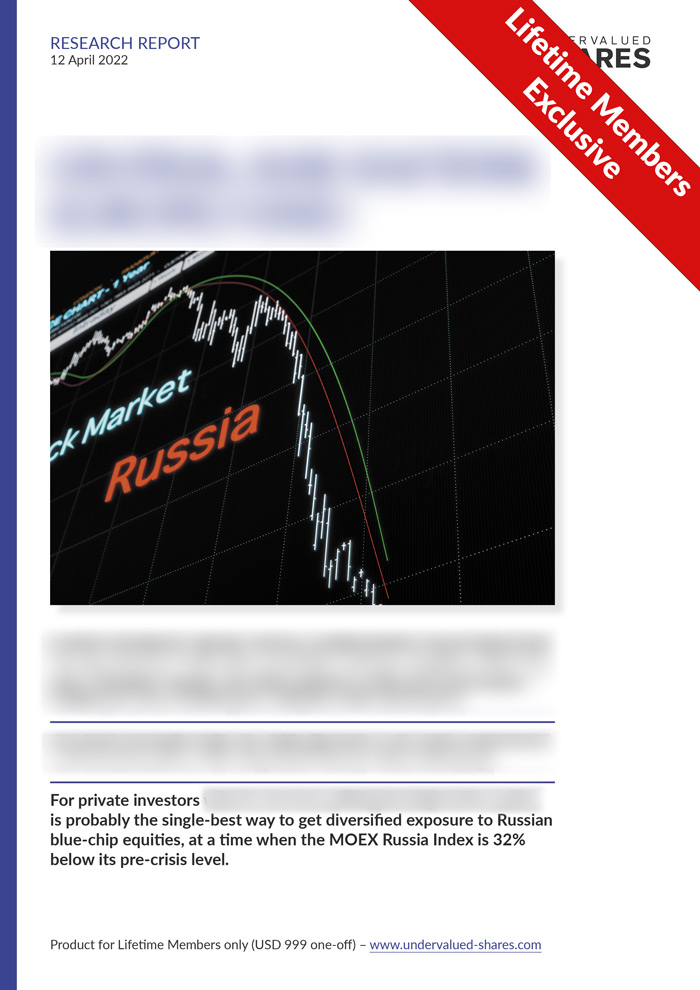Do you fear an energy shortage and sky-high oil prices because of the current sanctions against Russia? The invention of the "Latvian blend" will probably help make this less of a risk.
"Latvian blend" is the latest innovation of the global energy markets. It's 49.99% Russian oil and 50.01% oil that is sourced elsewhere. Technically speaking, it's not Russian oil and, therefore, doesn't fall under Russian sanctions.
Bloomberg called it "the backdoor that keeps Russian oil flowing into Europe". Whatever you think of the politics behind it, it's a sign that markets create solutions.
I wonder if this is indicative that the near future will turn out less gloomy than we might fear.
The passing problem that is Russia
Did you hear that the US decided to exclude fertiliser from its sanctions against Russia?
You'll be forgiven if you haven't come across this nugget of information yet. Much as the corporate media made a huge story out of the sanctions in general and their risk to the world's food supply, you'll be hard-pressed to find headlines about the subsequent exclusion of fertiliser. Yet, it did happen.
The European Union, in turn, quietly removed a number of metals from the sanctions list.
I am not judging whether this is a good or bad thing. However, learning of these developments made me look a bit more closely at the question what the real fallout of these sanctions is going to be.
When you speak to well-placed sources privately, you'll learn that private enterprise (including in the West) is already on the case of finding ways and means to legally sidestep the sanctions.
Delivering technology and spare parts to Russia? I am reliably informed that many Western corporations are currently speaking to a range of jurisdictions that will offer to buy these products and sell them on to Russia. Keep in mind, nations with 4bn people have refused to support the West's sanctions against Russia.
In Russia, the finance industry has put the wheels in motion to create alternative mechanisms to ensure its financial system can keep operating. Mark my words, in a few months (and by autumn 2022 at the latest), you'll get to read about new means and ways through which investors and corporations exchange rubles against Western currencies.
There is a political side to this, which is worthy of discussion but shall not be the aim of this article.
What I want to convey is this: when it feels like there is no way forward and the entire world consists of problems, that's usually the point when surprise solutions surface. It's also the point of maximum pessimism.
To stick to the example of Russia, we've recently seen such a turning point, even though it didn't feel like it at the time. When Western bourses stopped trading in Russia-related equities, it looked like that'd be the end of these companies and their stocks. The subsequent sell-off drove the price of Gazprom down to a miniscule USD 0.31 per ADR. Investors panicked at the prospect of Gazprom stock becoming worthless altogether.
Fast-forward six weeks, and the stock is trading at the equivalent of USD 6 on the Moscow Stock Exchange (1 ADR in London equals 2 shares in Moscow). Whoever was on the buying side of that sales on the London Stock Exchange just made 18 times their money in a matter of weeks.
Seriously, why should Gazprom stock have become worthless overnight?
Just as much, who expected the West to drive the world to famine? Naturally, the Biden administration was going to be outspoken about the sanctions, as part of the usual theatrics in politics and the ongoing PR war against Russia. But it wasn't a surprise at all to see them quietly drop fertiliser from the sanctions list. Politicians have no problem at all portraying one thing and then doing another.
The conflict between Russia and Ukraine and its fallout for the people involved is terrible, but markets have already had time to digest these developments and I assume it's already fully priced in.
This includes these events' influence on the economic and financial situation of Western countries. Germany running out of gas and entering a deep recession seems scary, but the country has a track record of publicly castigating a "bad" form of energy but then quietly keeping it running when they realise that replacement sources aren't ready and they'd face having the lights go out. I wouldn't be surprised if the Germans kept buying gas from Gazprom for much longer than we currently think they will.
"What if Putin hits the nuclear button to wipe us all out?"
I can't guarantee that he won't. However, if you worry about the type of risks that no one could possibly underwrite, then you may as well stop being involved with anything. E.g., the San Francisco area could see a major earthquake tomorrow which could wipe out the global insurance industry. It could happen literally any day. Should that stop you from investing, working and going about your life?
My hunch is that we have probably already seen "Peak Putin", and peak worry about the effect that the sanctions will have on the world. Much as these subjects still dominate the daily headlines, for investors it's probably already time to move on and focus on other subjects.
What about the horrors elsewhere?
Granted, there is no shortage of other problems in the world right now:
- China seemingly tearing itself apart over Xi's "Zero COVID" policies.
- Supply chains de-globalising and moving towards regional trade blocks.
- Western inflation reaching levels last seen in the 1970s.
Each one of these issues would be worthy of a separate analysis. Following my record-length Weekly Dispatch about Ukrainian agriculture stocks last week, I wanted to keep this edition short and convey one message, first and foremost.
In my view, there is a good chance the coming months will bring an easing of the overall situation rather than a worsening, and opportunity coming out of that.
To stick to the examples mentioned above:
- Xi will figure out a way to declare victory over the pandemic. If he didn't, he'd be toast at the autumn 2022 summit of the Chinese Communist Party. Once it becomes clear that China will manage to retain its economic stability, its bombed-out Internet and tech stocks could become interesting. Some of them have become cheap in absolute terms.
- Global supply chains will eventually settle into a new way of operating. Case in point, the Latvian blend mentioned above. There'll be winners in all of this, e.g. Poland will get a lot more outsourced business that previously would have gone to Asia (aided by the huge number of educated Ukrainian refugees joining the Polish workforce).
- Rising consumer prices change consumption patterns and destroy demand. There is a good chance that we are currently seeing "Peak Inflation". The jury is still out, but there is no denying this could become the term du jour over the coming months. My gut feeling is that whenever a scary subject is already across all newspaper headlines and TV talk shows, the worst is already over.
I also believe there are a whole number of industries that could produce terrific outcomes for investors over the coming years, and where it's now worthwhile to go hunting for bargains. Without having done proper deep dives yet, sectors that I have on my radar include:
- PropTech, or property technology, i.e. the application of information technology and platform economics to real estate markets and construction. The bricks and mortar industry is woefully behind with integrating technology, and there is tremendous catch-up potential during the 2020s.
- Digital healthcare, or telehealth as it used to be called. This sector might finally truly take off as a result of the pandemic and the global mass penetration of smart phones. Our existing healthcare system is way too focussed on curing rather than preventing illness, which is where digital healthcare can come in as a game changer. I am convinced there are manifold investment opportunities available in digital healthcare that compare to buying Google or Amazon stock ten or 15 years ago.
- Food, nutrition, and agriculture. The past decades have seen ever cheaper, ever more processed foods. Given the rising levels of affluence in the world, I wonder if there will be a significant move back to more natural food. If there was, it could enhance the value of agricultural land and create opportunities for retailers, brands, and specialist services in this field.
If you have good investment ideas in this regard (or totally disagree with me that these sectors are worth looking at in the first place!), please do send me your thoughts or any material you might have. I read every email and reply to every single one of them, at least briefly.
We have seen a lot of carnage in markets recently, such as the bloodbath among lockdown-related pandemic plays. However, we are also already seeing entirely new opportunities coming out of it. E.g., Peloton (ISIN US70614W1009) just became the target of an activist investor who is pushing for a sale of the company. The stock is 85% off its pandemic high, and there may be money to be made from a sale or even a complete relaunch of the company's business model. Keep in mind that Amazon once fell by 97% and nearly went bankrupt. Adversity also creates new opportunity – always has done, always will do.
Amid the fallen angels of the past year or two, there'll be a few gems to invest in for short- or long-term profits. There'll be entirely new industries to invest in, or old industries that get reinvigorated as a result of recent events (think defence stocks!).
I'll be here to cover them for my readers, both in my free Weekly Dispatches and the products that are exclusive for Undervalued-Shares.com Members.
How to buy Russian stocks (on the cheap)
Admittedly, my latest investment idea is controversial, but it's a pretty clever niche opportunity that is ideally suited for private investors to exploit.
With most conventional ways to get exposure to Russian stocks currently blocked, here's a loophole on how to get in regardless.
How to buy Russian stocks (on the cheap)
Admittedly, my latest investment idea is controversial, but it's a pretty clever niche opportunity that is ideally suited for private investors to exploit.
With most conventional ways to get exposure to Russian stocks currently blocked, here's a loophole on how to get in regardless.
Did you find this article useful and enjoyable? If you want to read my next articles right when they come out, please sign up to my email list.
Share this post:









